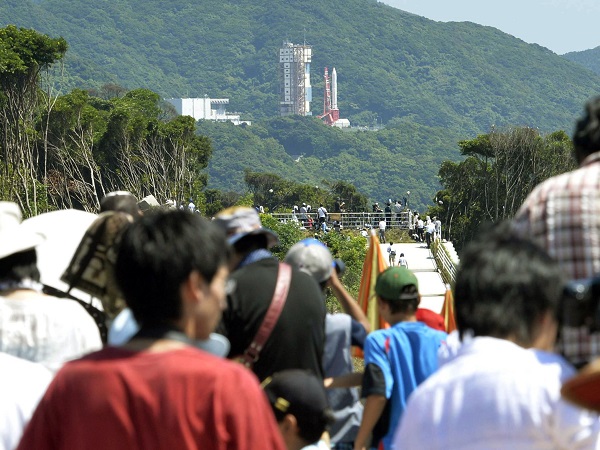Japan postpones launch of new, cheaper rocket

Spectators gather to watch an Epsilon rocket, seen in the background, before its launch at the Uchinoura Space Center in Kimotsuki town, Kagoshima, western Japan Tuesday, Aug. 27, 2013. The first Epsilon Launch Vehicle, a new type of solid-fuel rocket, is scheduled to launch later Tuesday carrying a space telescope designed to observe the planets. AP
TOKYO — Japan on Tuesday canceled the launch of a new rocket it hopes will be a cheaper and more efficient way of putting satellites into space, saying it suffered a problem 19 seconds before it was supposed to blast off.
Japan Aerospace Exploration Agency official Yuko Hoshikawa said an automatic countdown for the three-stage Epsilon rocket stopped when an irregularity in the rocket posture was detected. No further details were immediately available on the scrapped launch from a space center on the southern Japan island of Kyushu.
Hoshikawa said the cause of the problem is under investigation, and that it was unclear whether the launch would be rescheduled.
The Epsilon is the first new rocket design for Japan since the H2A was introduced in 2001. The H2A continues to be Japan’s primary rocket but officials are hoping development of the Epsilon will lead to improvements in the much more costly H2A program as well. Japan hopes to compete more aggressively in the international rocket-launching business.
Tuesday’s rocket was to carry the SPRINT-A, the first space telescope specifically designed to observe other planets. It is to be used to watch Venus, Mars and Jupiter.
According to JAXA, the Epsilon costs about 3.8 billion yen ($40 million), one-third the cost of the H2A. The rocket is about 24 meters (80 feet) tall, half the size of the H2A, and can be assembled and readied for launch in just one week, one-sixth of the time required for the H2A.
The Epsilon rocket, which uses a solid-fuel propellant, is meant to broaden the range of space missions Japan is able to perform and lower the hurdles to space by streamlining the launch process. JAXA says the rocket’s extensive use of computer technology means monitoring work that once required a fully staffed control room can now be done essentially on a single laptop.
“If we hope to make the access to space much easier, more sophisticated factors are required,” project manager Yasuhiro Morita said in a pre-launch statement. “We are trying to make rocket launches much simpler and ordinary events.”














